
Rehearsals for Revolution at Serendipity Art Festival, 2024
Rehearsals for Revolution at Serendipity 2024
Rehearsals for Revolution
An 8-channel sound installation (3 parts: 13 min, 20 min, 7 min)
Time: 15-22 December 2024
Venue: ‘A Haptic Score’, Old GMC Building, Panaji, Goa
Rehearsals for Revolution
An 8-channel sound installation
Composed and presented by Moushumi Bhowmik
with
Dibakar Saha (sound design and mix)
Purba Rudra (visual design, photographs, postcards)
Sunayan Roy (bulletin and posters)
Apurba Roy (research assistant)
Somsankar Ray (etchings, paintings)
Alok Som (origami)
Imprint (printer)
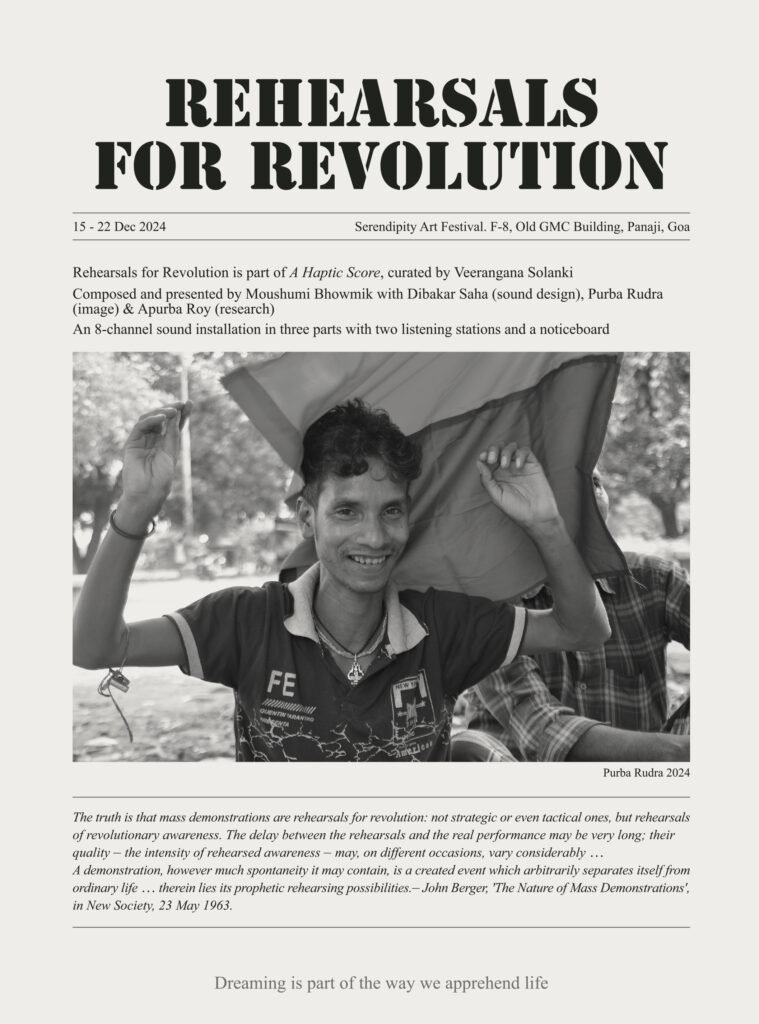
Cover page, bulletin. Designed by Sunayan Roy. Printed by Imprint.
Rehearsals for Revolution
Rise, Fall, Rise Again
Borrowing from John Berger, we have imagined this work as a tribute to the
revolutionary process; a composition on our dreams for change which do not die, however bleak the circumstances. It is composed in three parts entitled ‘Rise’, ‘Fall’ and ‘Rise Again’, with song, reverie, slogans, beginning with field recordings from an old factory site along the Hooghly River in West Bengal, which once saw a massive workers’ uprising, but is now lying in disuse and decay, waiting. Waiting for what? To the sounds of old protests are added sounds from newer ones, in our continued struggles for a just world, free from wars and oppression.
Rise, an excerpt
Fall, an excerpt
Rise Again, an excerpt
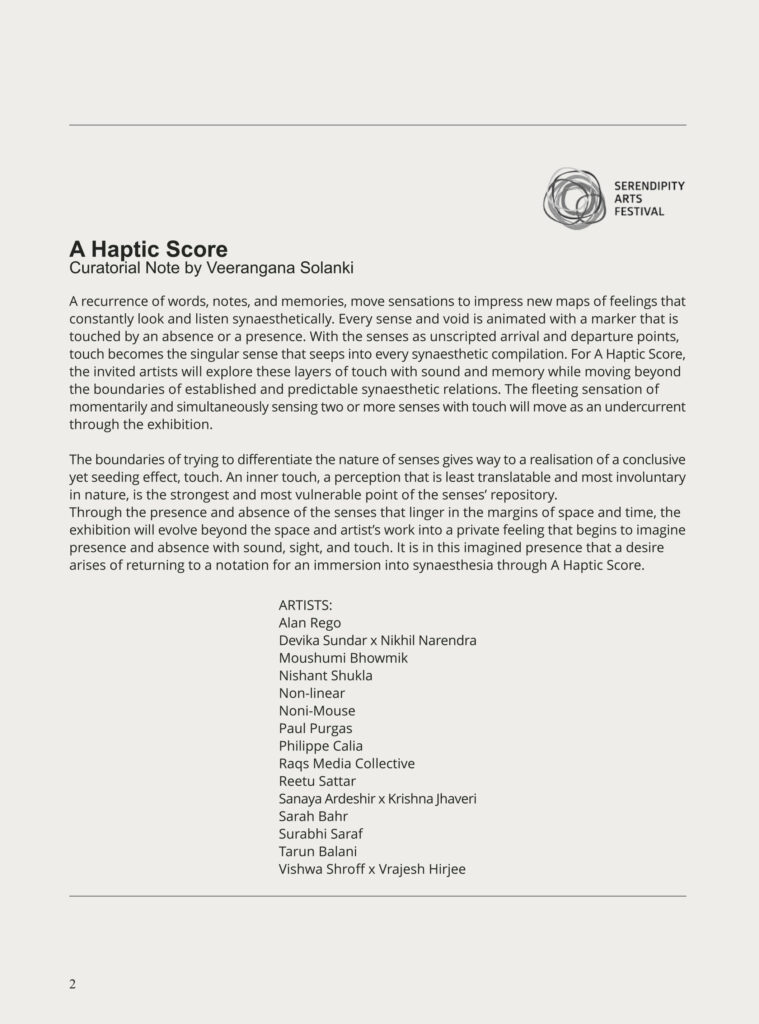
Rehearsals for Revolution is composed for the show ‘A Haptic Score’ at the Old GMC Building, Goa, curated by Veerangana Solanki, at Serendipity Art Festival 2024. It includes the works of fourteen other individual artists and collectives.
A Note on ‘Rehearsals’ by Moushumi
বিপ্লবের মহড়া
In 2023, I was in the Kanoria Jute Mill site with a bunch of students who were studying photography, but my lessons and exercises with them were all around sound and listening. I wanted them to try to listen to traces of old sounds in the places surrounding their school, the Resting Academy in Howrah. So, we went to a mill where there had been such a people’s uprising in 1993-94, that Kanoria was no longer just a jute mill but the name of an action, of an event in history. Workers in nearby factories and mills used to threaten their owners by saying, Kanoria baniye debo kintu, you better listen to us or we will do Kanoria to you.
Kanoria is a decaying site now. Some workers continue live in their derelict quarters; a man clearly jobless and drunk at daytime was following us and insisting that we should go and see the overflowing toilets, as a sign of how they lived.
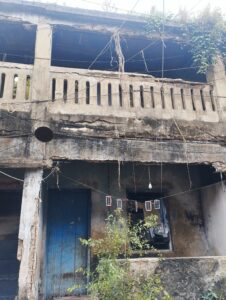
From our visit in November 2023. Sijberia, Howrah.
That day in 2023, as we were walking, we were talking with old trade unionists who were in the fight all those years ago, full of youthful energy, and are middle aged now, somewhat weary, but have not given up the fight. Later over the whole of 2024, I have gone back on my own and with friends to that area trying to understand that time. I have also gone back to my own time in the nineties and my association with various movements. Hence, I have been marching, albeit in slow steps, with my fellow marchers, through this work.
I think that the first day I went, when Pradip, Tapati and others were raising slogans, singing, remembering rail blockades in which thousands took place, the day when they broke open the factory gate, their community kitchens and clashes and other details from that time, the sonic power of their reminiscence was so immense that it had a profound impact on me. And I believe that the seed of this work was planted in me that day. Apurba Roy, my friend with whom I have marched in many demonstrations, has been part of my thinking in this work. And Dibakar, our sound designer, was just the right person for me. We could talk, think and work together with great ease.
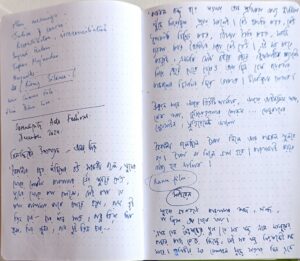
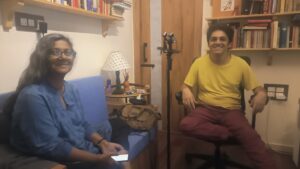
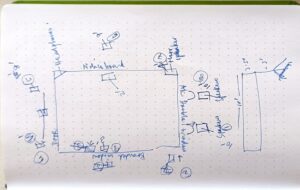
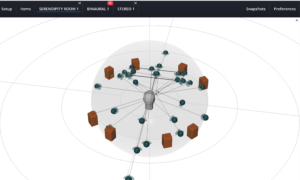
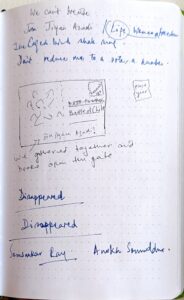
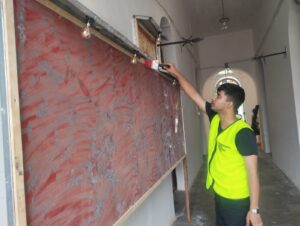
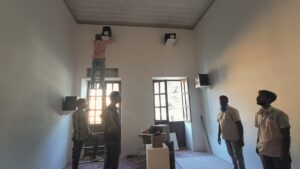
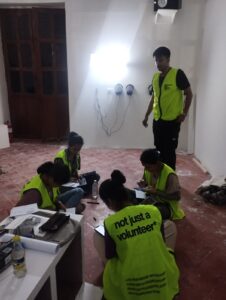
From imagining the composition, recording, to finally installing at Serendipity.
As we talked with old comrades, we remembered the Victoria Jute Mill incident, at the same time as Kanoria, where a striking worker named Bhikhari Paswan was disappeared by the management and police one day. Bhikhari never came back. A song I had written all those years ago about Bhikhari’s disappearance came back to me; it was lying forgotten in my own archive of the senses. I was almost shocked. I read novelist Amar Mitra’s tale of the disappeared, Niruddishter Upakhyan, about the disappeared Bairagi Mondal, and I knew we were telling the same story, in different forms, at different points of time. In this work our stories and songs come together.
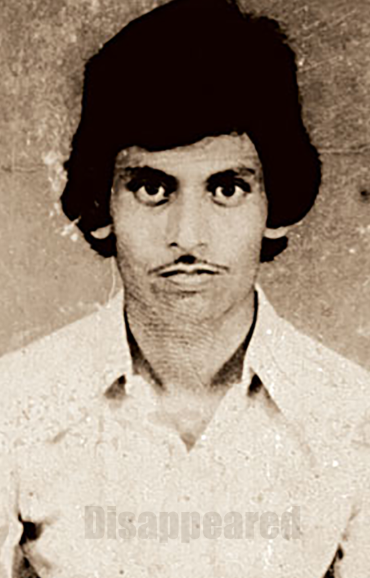
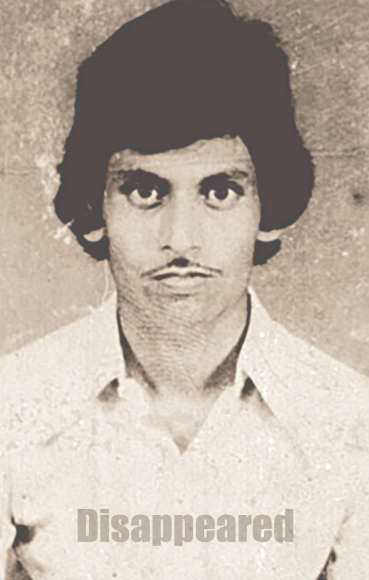
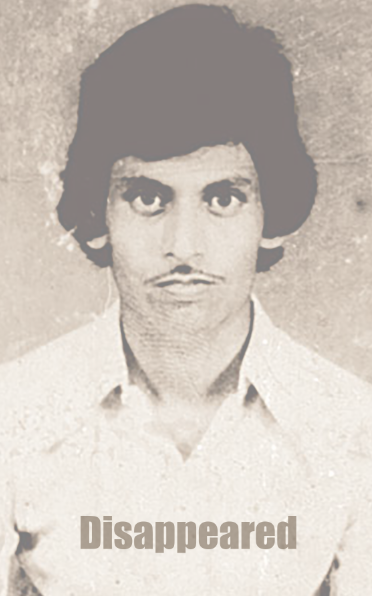
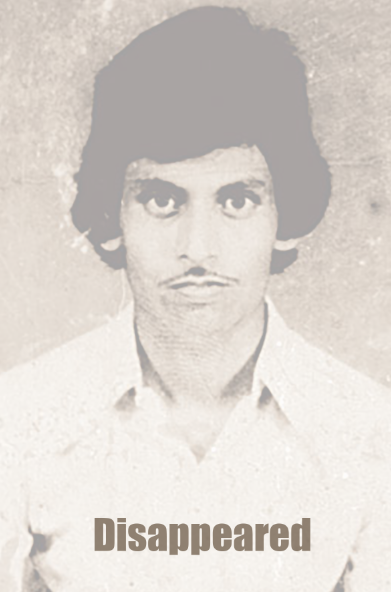
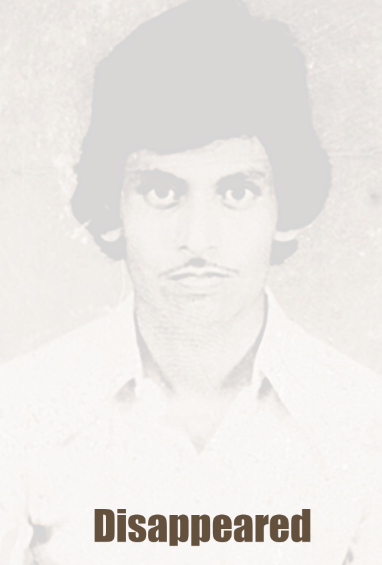

Our friend and comrade Amrit Paira, popularly known as Bapi, said, if a worker agitating at the gate was beaten up, he would go back, dress and bandage his wound and come back to the gate or the ‘battle front’. Such was the spirit at the time. I remembered Patricio Guzman’s Battle of Chile. I went back and watched all three parts and his sequel Obstinate Memory, and was so deeply moved that we have used his flute from Part 3 of Battle as an epigraph in our work. Prem, another friend from the Kanoria movement—his eyes shining when he talks, he said, I did not live in the time of the Paris Commune, but I lived in the time of Kanoria. Kanoria was my Paris Commune.
I had to watch Peter Watkins’ Le Commune and watch it over and over as I tried to give shape to ‘Rehearsals’. Hence, Le Commune finds its place in our work, as does Battle. We borrow without hesitation or remorse—I believe that our stories must meet and we must stand in the shade of our great storytellers. Especially when we are talking about dreaming and revolution.
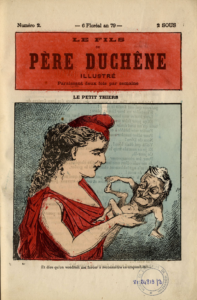
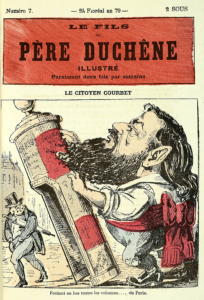
When we sent the bulletin for printing, this is as far as we had got.
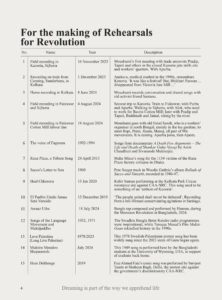
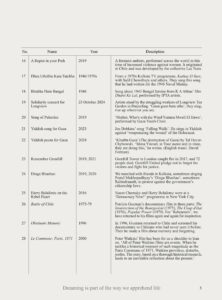
The work is built with much more than this list holds. To each and every
voice we are grateful. I shall make a longer and more detailed list later. For now, we must say that the Haal chhero na song that we use is not sung by Kabir Suman but by Rony or Shouvik, it is from a concert, and Suman is accompanying him on the keyboards. Also, we use two versions of the Palestinian song, O Mother, Sing to the Wind. The solo is by Nai Barghouti. Pages 4-5, Bulletin.
Our story is about movements past and present, also about the future. And we move across time in our pursuit of dreams. We walk through injustices, struggles, cruelties of states and corporations, and our hearts are filled with pain and joy. Grenfell Tower in London becomes Rana Plaza in Dhaka in our story, the farmers of Punjab become the worker of Paris. Women everywhere cry out for justice, the list is long… Our notice board and postcards, designed by Purba, are inspired by many movements. We are trying to send messages from one to the other. We are trying to connect our movements across time and places. This is our image of the resolve to keep dreaming.
The closed factory gate is a recurring motif in our work. Our friend, artist Somsankar Ray, gives us etchings from his work in the 1990s. Many of his works that we have borrowed from come out of the time of the Kanoria movement, but his works are not confined to any specific movement. An overwhelming sense of empathy guides his works and that is what guides us too, in our work. I am grateful to him for so generously letting us take from him and for letting us see with his eyes. We listen to his paintings and etchings in our work, translating across the senses, moving from sight to sound, from sound to touch, then coming back to the image, to text, to this writing.
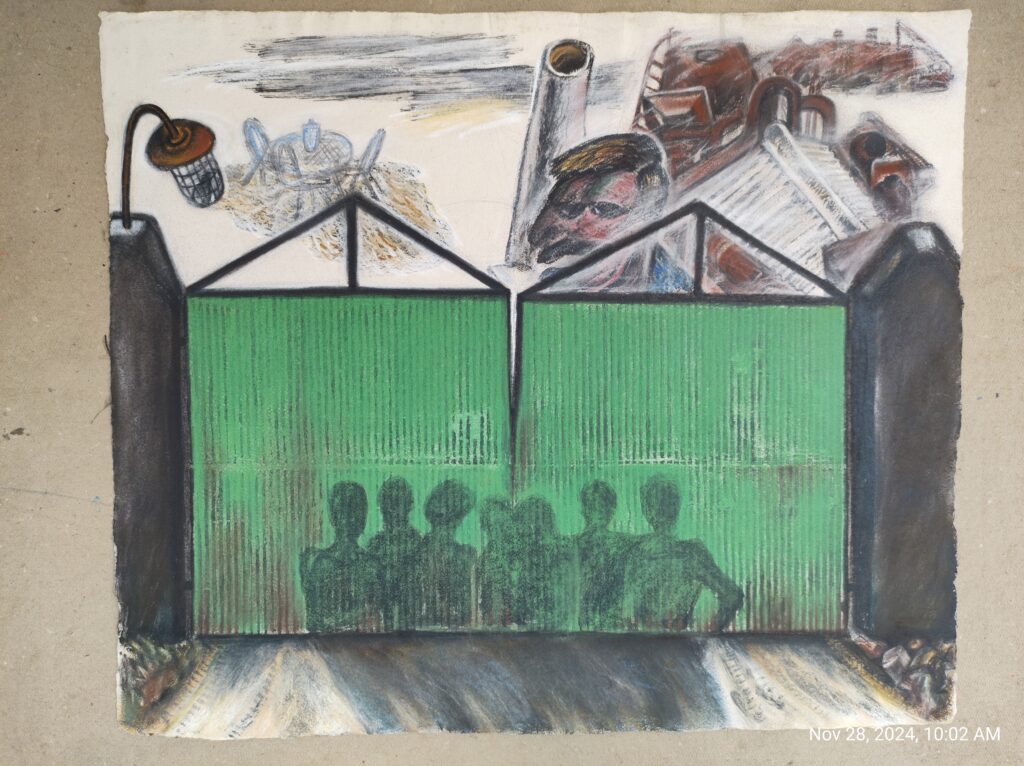
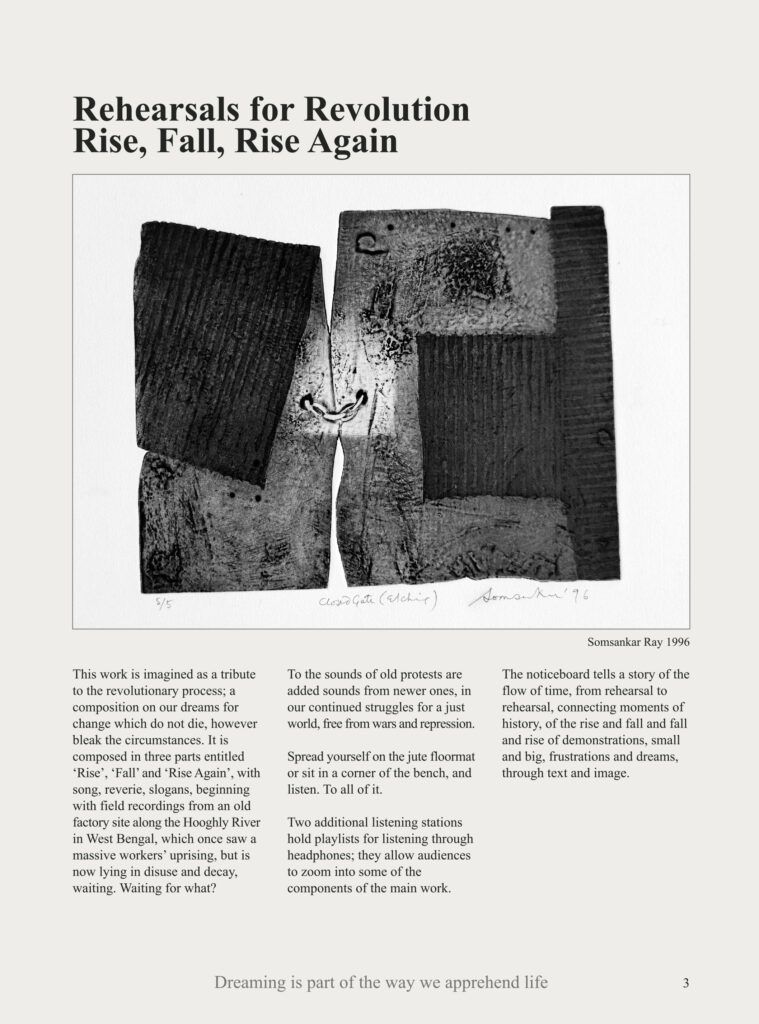
Page 3 from Bulletin for Rehearsals
I was sitting with Bapi, Jhunu, Prem in their union room and they were talking with wistfulness about the slain rebel leader of Chattisgarh, Shankar Guha Niyogi. They were talking about the laal hara jhanda, the red and green flag, the red and green uniform the workers wore during marches and the canopy of red and green palash flowers under which they marched, singing songs, shouting slogans.
Our friend, the artist Alok Som made us these flowers.
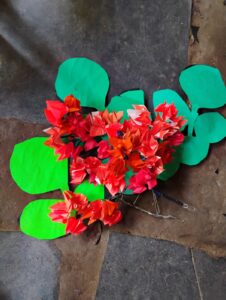
And here some of our postcards of solidarity.
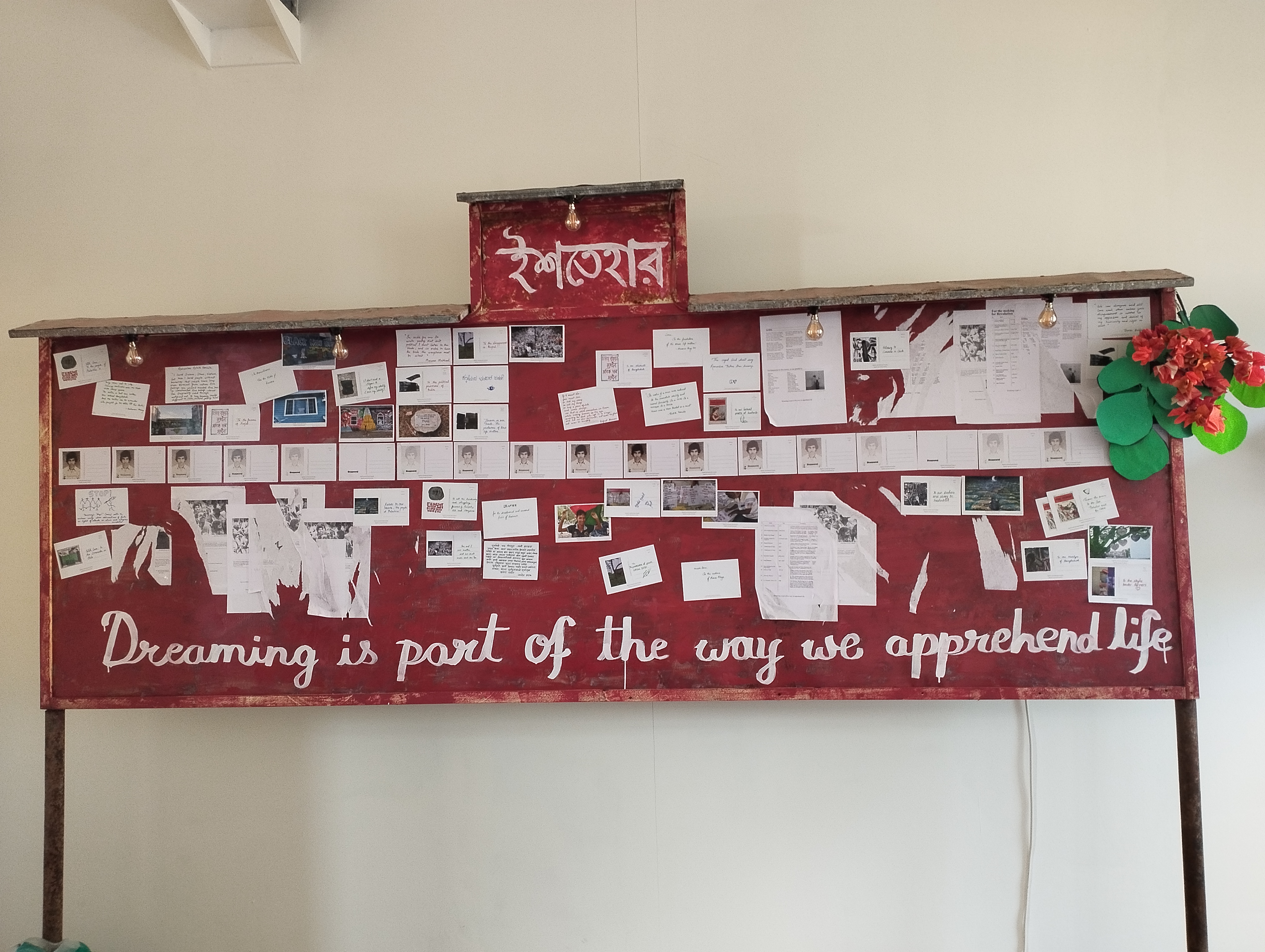
The postcards go from one movement to another, cutting across time and geographies. A bunch of young volunteers of Serendipity, bright eyes full of dreams and empathy, wrote the names of the addressees as they wished, in their own languages. They wrote poems and slogans as they felt the urge, and put them on this noticeboard which we call the ‘Istehar’ or Manifesto.
This work is about memory, about traces of past movements and also about the
seeds of revolution which are buried in every time, always germinating. It is built around the Bangla word গুমোড়, (gumor). A storm that is gathering strength, slowly building up, to come thrashing on the shore when the moment is ready. Gumor constitutes the rehearsals. The work is also built on the realisation that waves rise, they come to the shore, but they must also fall. Fall does not mean end here, fall is a waiting. Because ‘silence is never empty’. Hence, Rise, Fall and Rise Again. Fall is the longest section, as the waiting always takes much longer that the moment rising to the peak. It stays there, briefly. Then falls and we wait, for another rise.
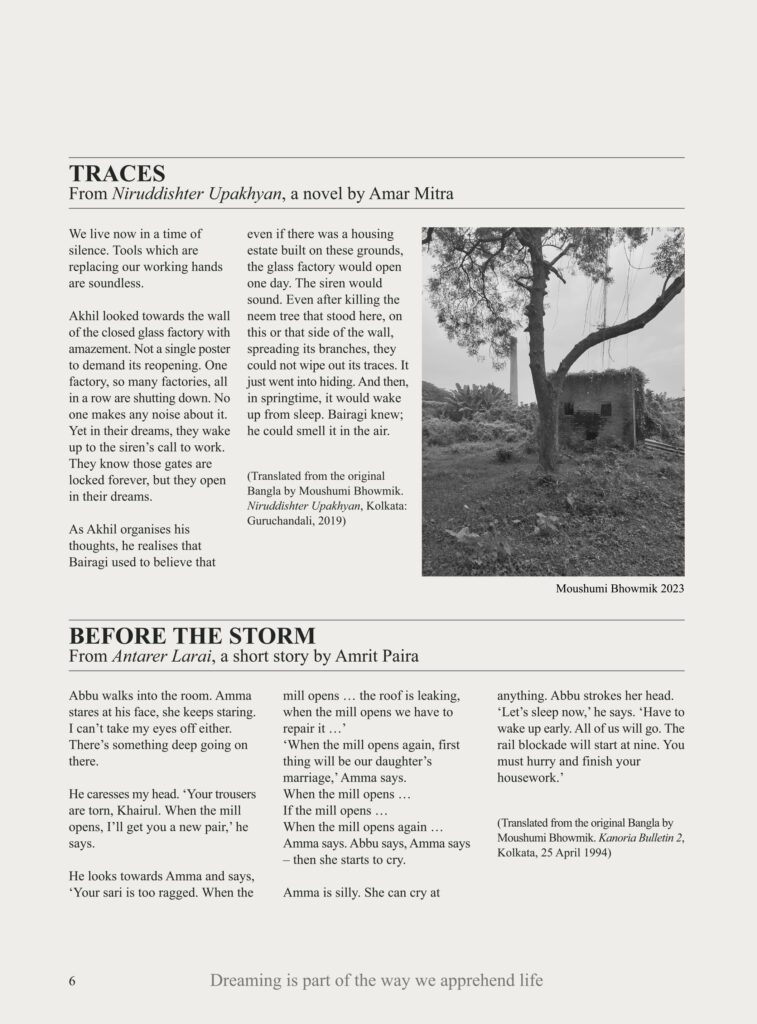
Page 6 from our bulletin
We have two additional listening stations here, for listening through headphones. The players hold some of the sounds from the composition, that we would like the listener to zoom into, to listen more closely. They are divided into two parts, Field Recording and Songs. They also hold some sounds we wanted to, but could not keep in our composition.
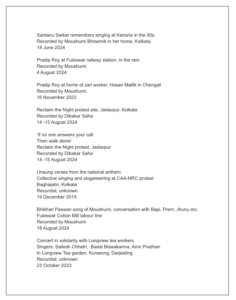
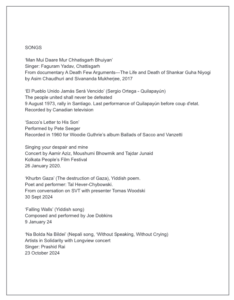
In gratitude
I am grateful to Veerangana Solanki for asking me to take part in ‘A Haptic Score’ and to Serendipity 2024 for making room for us. Besides, this work has been created collectively, and I am grateful to
Agnimitra
Ajanta
Alok Patra
Amitava Chowdhury
Amrit Paira
Baddinath
Ben Rogaly
Dinah Bird
Jainal
Jhunu (Shukla Kundu)
Joe Dobkin
Maha Mirza
Manoj Das
Mouli
Pradip Roy
Premananda Dan
Rachna Oimbe
Ramvachan Singh
Reem Falaknaz
Samik Chakraborty
Santanu Sarkar
Saydia Gulrukh
Sheikh Abdul Wahid
Tal Hever-Chybowski
Tapati Chatterjee
And many others.
- Her Voices at ‘Like Air, I’ll Rise’, Experimenter, 2024
- Baba Betar at Chobi Mela Shunyo 2021
- A Slightly Curving Place 2020
- Chobi Mela Biennale, 2019
- Time upon Time: Arnold Bake in Bengal 2016
- Baul Fakir Utsav 2006-2015
- Travelling Archive in East London 2015
- Footsteps of Sound 2013
- Unbox 2013
- Life of Rivers, 2011
